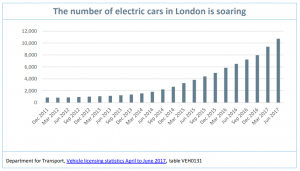You would be hard pressed to have not noticed the cries for a more sustainable way of living getting louder, and the Government is listening, committing to ensure all vehicles sold by 2035 are zero emission.
In order to make this a reality, the Government also intends for the vast majority of charging stations required be privately funded, and will alter planning requirements so as to achieve this.

Electric vehicle use has risen sharply in London over the last few years. The draft London Plan, requires that one in five parking spaces should have electric charging points to future proof London. However, it has been suggested that the number of charging points is already insufficient for London’s electric vehicle use.
But charging points can cause a bit of a dilemma for service charge teams trying to pull together estates charges for new developments. Is the cost of the plant, installation, repair and maintenance, as well as the electricity, fully recoverable? If contributions are the sole responsibility of the owner of the car parking space, then they are subsidising other users; if all residents in a block of flats pay an equal amount, those who travel via public transport are penalised; a pay as you go system might seem fairest but is likely to put some off using electric cars.
Perhaps fairest is a licence fee arrangement; whereby each car user obtains a licence, linked to their property, and there is a separate charge for the licence maintenance. This could be enforced by direct covenant and then wouldn’t disadvantage those parties not using the facilities.
However, you may find that you are constrained by the terms of your s.106 agreement as to how maintenance and cost be apportioned between residents. Where this is the case we would strongly recommend obtaining a review of the relevant terms and if accepted, explaining this to residents carefully. If the proposals are completely untenable then it may be that a variation is required to the s.106 agreement, and it’s best to think about those hurdles in good time rather than trying to negotiate against a build and sales launch deadline.
For further advice on planning obligations, s.106 variations, or electric charging points, please contact our development sales team.
You may also be interested in our articles on Decarbonisation. Take a read of our recent articles covering Procurement Challenges and Development Challenges.

